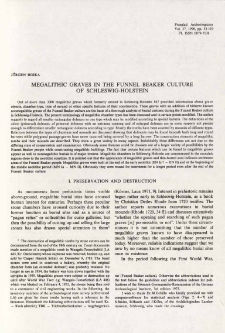- Wyszukaj w całym Repozytorium
- Piśmiennictwo i mapy
- Archeologia
- Baza Młynów
- Nauki przyrodnicze
Wyszukiwanie zaawansowane
Wyszukiwanie zaawansowane
Wyszukiwanie zaawansowane
Wyszukiwanie zaawansowane
Wyszukiwanie zaawansowane

Obiekt
Tytuł: Megalithic graves in the Funnel Beaker Culture of Schleswig-Holstein
Inny tytuł:
Przegląd Archeologiczny T. 37 (1990)
Wydawca:
Polska Akademia Nauk. Instytut Historii Kultury Materialnej
Miejsce wydania:
Opis:
Typ obiektu:
Abstrakt:
Out of more than 3000 megalithic graves which formerly existed in Schleswig-Holstein 867 provided information about grave objects, chamber-type, type of mound or other specific features of their construction. These graves with an addition of hitherto known nonmegalithic graves of the Funnel Beaker culture are the basis of a thorough analysis of burial customs during the Funnel Beaker culture in Schleswig-Holstein. The present terminology of megalithic chamber types has been discussed and in certain points modified. The author suggests to regard all smaller rectangular dolmens as one type which may be modified according to special features. The definitions of the oldest (primeval) dolmens, of primeval dolmens with an entrance opening and of enlarged dolmens are in some respects not precise enough to differentiate smaller rectangular dolmens according to type. Mostly the tombs have been covered by mounds of different types. Relations between the types of chambers and mounds are discussed showing that dolments may be found beneath both long and round barrows while polygonal passage-graves have never occurred being covered by a long barrow. The construction elements of megalithic tombs and their mounds are described. They show a great variety in many aspects. Indubitably these differences are not due to the differing state of conservation and examination. Obviously some features could be choosen out of a larger variety of possibilities by the Funnel-Beaker people while constructing megalithic buildings. The fact that certain features which can be found in megalithic graves appear as well in nonmegalithic burials is of major interest. Megalithic chambers in Schleswig-Holstein are concentrated in the morainic regions close to the neolithic coastline. It is pointed out that the appearance of megalithic graves and thin-butted axes indicates settlement areas of the Funnel-Beaker people. Megalithic graves were built at the end of the early neolithic (EN Ic ? - EN II) and at the beginning of the middle neolithic period (MN la - MN II). Obviously they were reused for interments for a longer period even after the end of the Funnel Beaker culture
Czasopismo/Seria/cykl:
Tom:
Strona pocz.:
Strona końc.:
Szczegółowy typ zasobu:
Format:
Identyfikator zasobu:
oai:rcin.org.pl:61134 ; 0079-7138
Źródło:
IAiE PAN, sygn. P III 149 ; IAiE PAN, sygn. P III 272 ; IAiE PAN, sygn. P III 353 ; kliknij tutaj, żeby przejść
Język:
Prawa:
Prawa zastrzeżone - dostęp ograniczony
Zasady wykorzystania:
Digitalizacja:
Instytut Archeologii i Etnologii Polskiej Akademii Nauk
Lokalizacja oryginału:
Biblioteka Instytutu Archeologii i Etnologii PAN
Dofinansowane ze środków:
Ministra Nauki i Szkolnictwa Wyższego ; Działalność upowszechniająca naukę (DUN)
Dostęp:
Kolekcje, do których przypisany jest obiekt:
- Repozytorium Cyfrowe Instytutów Naukowych > Kolekcje Partnerów > Instytut Archeologii i Etnologii PAN > Publikacje Pracowników i Wydawnictwa IAE PAN
- Repozytorium Cyfrowe Instytutów Naukowych > Kolekcje Partnerów > Instytut Archeologii i Etnologii PAN > Publikacje Pracowników i Wydawnictwa IAE PAN > Czasopisma bieżące
- Repozytorium Cyfrowe Instytutów Naukowych > Piśmiennictwo > Czasopisma/Artykuły
- Repozytorium Cyfrowe Instytutów Naukowych > Kolekcje Partnerów > Instytut Archeologii i Etnologii PAN > Publikacje Pracowników i Wydawnictwa IAE PAN > Czasopisma bieżące > Przegląd Archeologiczny
Data ostatniej modyfikacji:
2 lut 2022
Data dodania obiektu:
8 gru 2016
Liczba pobrań / odtworzeń:
60
Wszystkie dostępne wersje tego obiektu:
https://rcin.org.pl./publication/80284
Wyświetl opis w formacie RDF:
Wyświetl opis w formacie RDFa:
Wyświetl opis w formacie OAI-PMH:
| Nazwa wydania | Data |
|---|---|
| Hoika, Jürgen (1941-2005), 1990, Megalithic graves in the Funnel Beaker Culture of Schleswig-Holstein | 2 lut 2022 |
Obiekty Podobne
Krzak, Zygmunt (1933– )
Gurba, Jan (1929– )
Wiklak, Henryk
Tabaczyńska, Eleonora
Kowalczyk, Jan (1918–2007)
Baczyńska, Barbara
Wiślański, Tadeusz (1931–1989)

 INSTYTUT ARCHEOLOGII I ETNOLOGII POLSKIEJ AKADEMII NAUK
INSTYTUT ARCHEOLOGII I ETNOLOGII POLSKIEJ AKADEMII NAUK
 INSTYTUT BADAŃ LITERACKICH POLSKIEJ AKADEMII NAUK
INSTYTUT BADAŃ LITERACKICH POLSKIEJ AKADEMII NAUK
 INSTYTUT BADAWCZY LEŚNICTWA
INSTYTUT BADAWCZY LEŚNICTWA
 INSTYTUT BIOLOGII DOŚWIADCZALNEJ IM. MARCELEGO NENCKIEGO POLSKIEJ AKADEMII NAUK
INSTYTUT BIOLOGII DOŚWIADCZALNEJ IM. MARCELEGO NENCKIEGO POLSKIEJ AKADEMII NAUK
 INSTYTUT BIOLOGII SSAKÓW POLSKIEJ AKADEMII NAUK
INSTYTUT BIOLOGII SSAKÓW POLSKIEJ AKADEMII NAUK
 INSTYTUT CHEMII FIZYCZNEJ PAN
INSTYTUT CHEMII FIZYCZNEJ PAN
 INSTYTUT CHEMII ORGANICZNEJ PAN
INSTYTUT CHEMII ORGANICZNEJ PAN
 INSTYTUT FILOZOFII I SOCJOLOGII PAN
INSTYTUT FILOZOFII I SOCJOLOGII PAN
 INSTYTUT GEOGRAFII I PRZESTRZENNEGO ZAGOSPODAROWANIA PAN
INSTYTUT GEOGRAFII I PRZESTRZENNEGO ZAGOSPODAROWANIA PAN
 INSTYTUT HISTORII im. TADEUSZA MANTEUFFLA POLSKIEJ AKADEMII NAUK
INSTYTUT HISTORII im. TADEUSZA MANTEUFFLA POLSKIEJ AKADEMII NAUK
 INSTYTUT JĘZYKA POLSKIEGO POLSKIEJ AKADEMII NAUK
INSTYTUT JĘZYKA POLSKIEGO POLSKIEJ AKADEMII NAUK
 INSTYTUT MATEMATYCZNY PAN
INSTYTUT MATEMATYCZNY PAN
 INSTYTUT MEDYCYNY DOŚWIADCZALNEJ I KLINICZNEJ IM.MIROSŁAWA MOSSAKOWSKIEGO POLSKIEJ AKADEMII NAUK
INSTYTUT MEDYCYNY DOŚWIADCZALNEJ I KLINICZNEJ IM.MIROSŁAWA MOSSAKOWSKIEGO POLSKIEJ AKADEMII NAUK
 INSTYTUT PODSTAWOWYCH PROBLEMÓW TECHNIKI PAN
INSTYTUT PODSTAWOWYCH PROBLEMÓW TECHNIKI PAN
 INSTYTUT SLAWISTYKI PAN
INSTYTUT SLAWISTYKI PAN
 SIEĆ BADAWCZA ŁUKASIEWICZ - INSTYTUT TECHNOLOGII MATERIAŁÓW ELEKTRONICZNYCH
SIEĆ BADAWCZA ŁUKASIEWICZ - INSTYTUT TECHNOLOGII MATERIAŁÓW ELEKTRONICZNYCH
 MUZEUM I INSTYTUT ZOOLOGII POLSKIEJ AKADEMII NAUK
MUZEUM I INSTYTUT ZOOLOGII POLSKIEJ AKADEMII NAUK
 INSTYTUT BADAŃ SYSTEMOWYCH PAN
INSTYTUT BADAŃ SYSTEMOWYCH PAN
 INSTYTUT BOTANIKI IM. WŁADYSŁAWA SZAFERA POLSKIEJ AKADEMII NAUK
INSTYTUT BOTANIKI IM. WŁADYSŁAWA SZAFERA POLSKIEJ AKADEMII NAUK




































